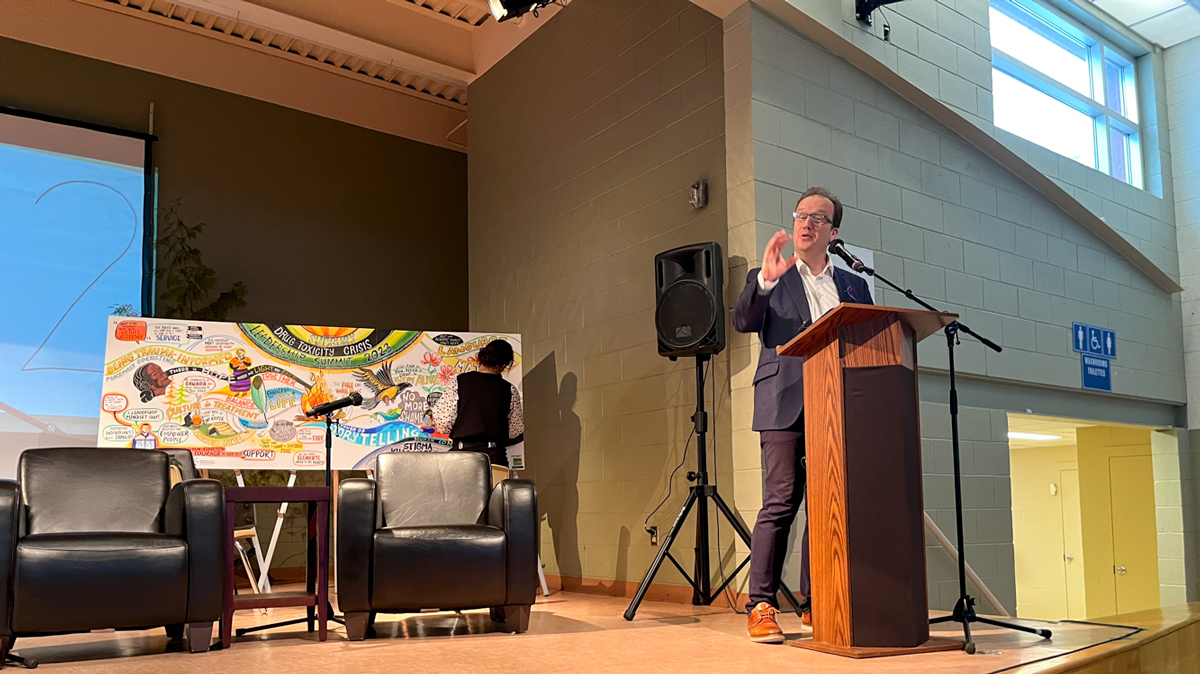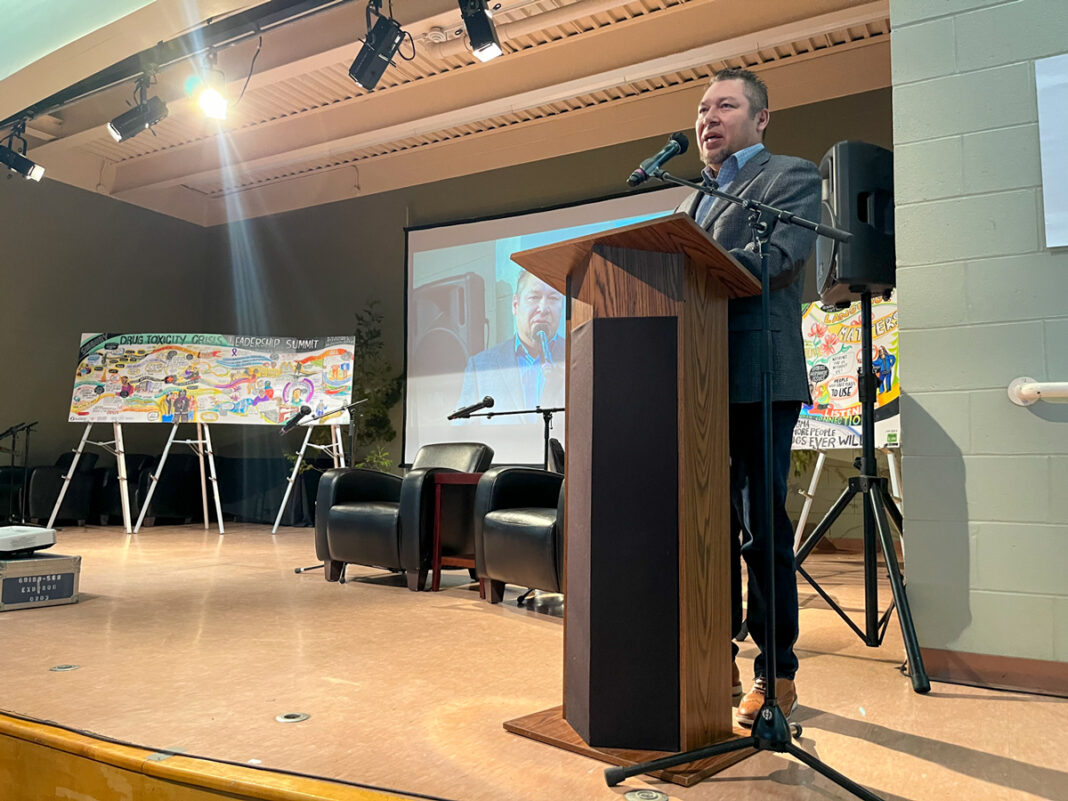GREATER SUDBURY—The Greater Sudbury Summit on Toxic Drugs, a pivotal two-day event that unfolded at the Dr. Edgar Leclair Community Centre and Arena on December 7 and 8, marked a crucial milestone in the collective effort to combat the growing drug crisis in the region. This gathering brought together a diverse group of community leaders and featured the voices of several Manitoulin First Nations experts. In doing so, it shone a light on the unique challenges and strengths of these communities in the face of the continuously intensifying toxic drug crisis.
It includes a call, from several of the participants, for a similar “summit” on the same theme to be convened on Manitoulin Island to include local stakeholders.
The urgency of the summit was precipitated by alarming statistics from the Office of the Chief Coroner for Ontario, revealing a toxicity death rate in Northern Ontario nearly three times higher than the provincial average. Despite various interventions, the crisis has persisted, prompting the Board of Health for Sudbury and districts and Greater Sudbury City Council to endorse the need for a localized leadership summit to prioritize Greater Sudbury and Manitoulin’s communities.
The summit, designed to address the crisis comprehensively, sought to discuss collective efforts, successes and challenges in the hope of developing innovative strategies. It emphasized the prevention of drug-related harm and aimed to foster collaboration between key stakeholders. It served as a platform to develop actionable next steps, processes, and structures that would effectively mitigate harms and ensure accountability in the ongoing struggle against toxic drug abuse in the region. Distinguished speakers, including Tim Ominika from the Anishinabek Nation, Sam Gilchrist, executive director of Gwekwaadziwin Miikan, Jonathan Michael Peltier from the Wiikwemkoong Justice Program and Sudbury Mayor Paul Lefebvre of Greater Sudbury, alongside other passionate community members, comprised the presenting roster.

Sudbury Mayor Paul Lefebvre, in a public statement at a press conference Friday following the two days of discussions which had been closed to the press and the public, emphasized the necessity of diverse supports to combat the drug crisis effectively. He called for greater coordination among organizations in Greater Sudbury, urging a thorough examination of current efforts and the exploration of new collaborative strategies. The summit aimed to examine and enhance existing efforts, fostering a more collaborative approach that respects these diverse communities’ unique needs and strengths. Mayor Lefebvre particularly championed initiatives addressing homelessness related to local addictions, advocating for more warming stations to keep the unhoused warm in winter and supporting the Lorraine Street Affordable Housing Project. City Council approved the development of a 40-unit affordable housing complex earlier this year to be built on Lorraine Street, intended to support vulnerable populations.
Jonathan Michael Peltier, a member of Wiikwemkoong Unceded Territory, shared a deeply personal account of overcoming opioid addiction and incarceration. As a justice worker with the Wiikwemkoong Justice Program, Mr. Peltier emphasized the crucial role of harm reduction services within Manitoulin Island’s Indigenous communities. His focus on reintegration underscored the transformative power of reconnecting with culture and ancestral roots, echoing the resilient spirit of the Manitoulin Island community. He also highlighted the importance of collective community supports in preventing relapse, emphasizing that, through the incorporation of the Teachings of the Seven Grandfathers and concerted efforts from multiple services working together, communities can construct a robust social scaffolding that aids and supports people who have a substance use disorder on various fronts. A critical piece of this process, Mr. Peltier said, was developing and implementing more transitional homes. Housing remains an immediate barrier to many unhoused citizens battling addictions. Transitional housing represents a temporary accommodation intended to bridge the gap between a person’s homelessness and permanent housing by providing structure and support to those in need. Often, this form of project is implemented as a means of combating addictions and mental health challenges by facilitating the development of life skills, as well as educational and vocational training.
Sam Gilchrist, executive director of Manitoulin’s Gwekwaadziwin Miikan, described the recent event as an incredible opportunity for networking with various community partners. However, he told The Expositor that he was disappointed that voices from smaller municipalities, such as Chapleau and others along the Highway 69 corridor, needed to be adequately incorporated. Mr. Gilchrist emphasized the importance of multi-year commitments and financial backing for the proposed approaches. He highlighted the need for flexibility in addressing changing needs and variables like substances and consumption methods. Drawing attention to the challenges faced by safe injection sites in Sudbury due to rigid legislation and limited funding, Mr. Gilchrist stressed the importance of avoiding similar problems in their proposed initiatives. He commended the summit for focusing on lived experiences, advocating for solutions that prioritize the interests of those suffering from addictions over a top-down approach. Mr. Gilchrist also emphasized the importance of destigmatizing supports and creating a “no wrong door” approach, making referrals easily accessible to connect people with appropriate services and assistance.
As a further observation, Mr. Gilchrist expressed the desire to see a similar summit organized for Manitoulin and its surrounding areas. He underscored the need for extensive regional collaboration on a large scale, emphasizing the importance of unity among cities like Sudbury, Sault Ste. Marie and smaller communities. Mr. Gilchrist highlighted the pervasive nature of drug problems, pointing out that users are not confined to one location and may move from community to community. This mobility necessitates a comprehensive approach to education and services that extends beyond the boundaries of individual communities. The goal of fostering collaboration among various regions is to establish a unified front in tackling substance abuse issues and ensure that educational efforts and support services are accessible and effective across a broader geographical area.
Tim Ominika, a respected Wiikwemkoong Unceded Territory member and representative of the Anishinabek Nation, shared insights as a mental health addiction system specialist with The Expositor. With a wealth of experience spanning over 14 years, Mr. Ominika highlighted the need for a collective effort to support First Nations communities within the Anishinabek Nation Territory. He emphasized the importance of collaborative community involvement in addressing health and wellness issues in the Greater Sudbury and District region and Manitoulin Island. Rooted in his Anishnaabe culture, Mr. Ominika expressed the need for holistic community-driven approaches to addressing First Nations communities’ mental health and wellness challenges. His perspective highlighted the importance of collective action and the integral role that Indigenous voices play in crafting effective and tailored solutions.
Among Mr. Ominika’s suggestions was the impending implementation of a ‘safe supply project,’ a touchy subject but a potentially game-changing initiative for Manitoulin communities. This project aims to provide medical attention to those suffering from addictions through the involvement of physicians, often working in conjunction with pharmacists, to offer monitoring and access to medical-grade varieties of substances free from contamination. The project presents a bold new approach to harm reduction, seeking to keep people with addiction and the community safe from tragic overdoses resulting from improper use or tainted narcotics. This innovative approach garnered support from an Anishinabek Nation Chiefs-in-Assembly when proposed by Mr. Ominika and his confederates earlier this year. However, despite optimism about the future of this initiative, Mr. Ominika acknowledged that provincial legislation has sometimes played a mischievous role in limiting the adaptability of social services and harm reduction workers to stay ahead of current trends. Mr. Ominika said that provincial guidelines and policies created service silos which contributed to rendering individual social services less effective in handling a crisis of this magnitude.
When The Expositor asked whether he and his colleagues foresaw any potential issues arising from the imminent Robinson Huron treaty settlement and the subsequent disbursement of funds, Mr. Ominika expressed deep concern. He highlighted the inherent risks associated with distributing substantial sums of money to individuals who may be grappling with substance abuse problems, emphasizing the potential for harm and predatory behaviours. To address these concerns, Mr. Ominika and his colleagues have proactively engaged with 21 of the Anishinabek nations they serve in the Robinson-Huron Treaty territory. (The Anishinabek Nation serves a total of 39 communities.)
They aim to provide further educational support, promote available services, and initiate a dialogue surrounding the anticipated challenges the settlement may pose in specific communities. Emphasizing the need for collaboration, Mr. Ominika stressed the importance of a unified front to mitigate the impacts of the opioid and drug crisis. He also, with Mr. Gilchrist, proposed hosting a similar summit on the Island, bringing together various community stakeholders, including representatives from mental health, social services, law enforcement and private entities. Manitoulin, home to one of the largest Anishinabek populations, is pivotal in this collaborative effort. However, he quickly stated the importance of working with various communities as the drug epidemic transcends cultural and regional boundaries.
Mr. Ominika elucidated the benefits of uniting community stakeholders to discuss potential funding options and strategies. Recognizing the universal nature of the epidemic, he emphasized the necessity for diverse community involvement to address this substantial burden collectively. To further this aim, he wanted to see programming like the Peer Support and Outreach Program in M’Chigeeng expanded into other communities, potentially delivered on a Manitoulin-wide level. However, Mr. Ominika stated that many bureaucratic challenges still thwart meaningful and effective assistance. Perhaps the most challenging to address included the need for policy changes and more transparent funding agreements from provincial and municipal governments to support local services. Mr. Ominika also highlighted the issue of policies creating disjointed service delivery, emphasizing the importance of breaking down these barriers to facilitate more cohesive and comprehensive support for affected communities.
As the summit concluded, Manitoulin Island and Greater Sudbury eagerly anticipate the implementation of initiatives that honour addicted and Indigenous voices, offering hope for a brighter and healthier future for all communities affected by the devastating impacts of substance abuse. The collaboration with Public Health Sudbury and Districts is expected to be crucial in turning these initiatives into actionable solutions, transforming the theoretical into practice. The summit served as a platform for dialogue and a catalyst for meaningful collaboration and community-driven action in the ongoing battle against addictions. This event is a testament to the impact of communities coming together, with the potential to create lasting positive change that extends far beyond the summit’s conclusion.
by Ed Prudhomme





